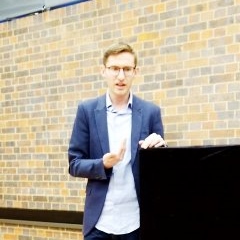click to dowload our latest edition
CLICK HERE TO SUBSCRIBE TO OUR NEWSLETTER


Published
6 years agoon
By
adminSIMON SHEER
“We don’t have to be the victims of our bias. We have to acknowledge that we have it and work to overcome it,” said Morris, reflecting on his company’s approach to Broad-Based Black Economic Empowerment (B-BBEE).
Limmud, to be held in August, is a highlight for anyone with a keen interest in Jewish history, culture, art and literature. Taste of Limmud is a preview of the annual event.
With two, hour-long sessions featuring three presentations each, the topics ranged from the lessons of totalitarianism to how traditional Japanese pottery can inform modern psychology.
I chose two talks that seemed to have little in common. Both raised deep questions about what it means to be a Jew and a South African.
Morris believes that any serious discussion of B-BBEE needs to take historical context into account. He explained that at the advent of democracy in South Africa, it was all too easy to get caught up in “rainbow nation” rhetoric while carrying on with business as usual.
Subsequent decades have tested this mythology, and we are now witnessing growing anger at the perceived slow rate of transformation.
He stressed that feeling annoyed by the situation was counterproductive. Instead, we should acknowledge that South Africa has massively under-delivered since 1994, and commit ourselves to address past injustice.
There is a positive side to transformation, Morris pointed out, saying B-BBEE is an unfairly maligned concept. Far from giving away resources, B-BBEE is a process of inclusion – growing the pie for everyone.
Though there are plenty of inefficiencies and shortcomings in the way B-BBEE is realised in the real world, the challenge is to work to make the system better.
Morris said that we have a clear choice: to sit back and blame the government for all the country’s shortcomings, or to use our privileged knowledge and creativity to address the injustices of past.
He documented some of the innovative programmes driven by FCB Africa designed to deliver tangible improvements, including an empowerment deal with the Maharishi Institute that secures high quality education for disadvantaged young women.
Speaking with one voice?
What does it mean to be a South African Jew? Is it one thing, or can it be many things? The local community is made up of diverse individuals, but arguably, it perceives itself as a homogenous entity with a common history and culture.
In the second talk, South African-born historian Shirli Gilbert, Professor of Modern History at the University of Southampton, pushed us to reflect on the way the community tells its story.
Gilbert is investigating how South African Jews who perceive themselves as marginal to the mainstream understand their relationship with the traditional cornerstones of Jewish identity.
The overwhelming dominance of orthodoxy (local reform movements are small and marginal) results in the phenomenon of the “unobservant orthodox”, those of us whose conception of a “proper” shul is invariably an orthodox one, but who rarely go, or who drive to shul on Shabbat.
The Holocaust has shaped community identity since the 1940s. It produced two divergent (though not mutually exclusive) strands: on the one hand, a commitment to non-racism and social justice; on the other, a strong sense of Jewish vulnerability and the need for a Jewish safe haven.
While many initially claimed that their attachment to Judaism had nothing to do with religion, as the interviews unfolded, participants revealed an attachment to ritual and practice, and the sense of community inherent in, for example, orthodox high holiday services, Gilbert said.
Many felt at home in orthodox services and weren’t comfortable with the idea of reform shuls, even though they might appear to accord more closely with their intellectual sensibilities.
Like the mainstream of South African Jews, interviewees’ identities were strongly tied to an awareness of the Holocaust. In many instances, this was expressed in a more universalist sense of the need to fight injustice and be sensitive to racism and prejudice.
Contrary to what may be expected from “marginal” Jews, an overwhelming number of participants felt a strong emotional attachment to Israel, while despairing of Israeli government policy in the preceding years.
“Without a doubt,” Gilbert said, this was “the most vexed, complicated, painful part of the interview.” Interviewees felt that they could not discuss these questions with fellow Jews out of fear of being hounded or further marginalised; nor were they comfortable discussing Zionism in non-Jewish circles, where they perceive a lack of nuance on the issue.
The debate engendered about being Jewish and South African was in line with Limmud’s ethos of diversity of thought, choice of speakers and culture of respectful debate – not to mention a diversity of snacks and lunch options.
Pictured: Josh Poyurs
